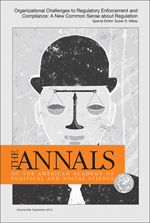Following the Great Recession, we have heard renewed calls for increased government regulation of the economy (including finance, banking, insurance, communications, environment, and employment) as a necessary safeguard against the excesses of exuberant capitalism. At the same time, opponents argue that government regulation not only dampens market efficiencies and hinders economic growth in general but specifically encourages the predatory and fraudulent practices responsible for the Great Recession.
This volume of The ANNALS analyzes the bodies of scholarship on regulation as well as the empirical models and policy advice that have both fueled and responded to conventional public regulation by rethinking these paradigms from the perspective of the regulated organizations—in all their diversity and complexity. The volume suggests that a new common sense about regulation acknowledges the ubiquity of legal regulation and the contextual conditions that frame the normative interpretations, the global circulation of regulation that has transformed its scale, and finally the role of the organization as the locus of regulation.

